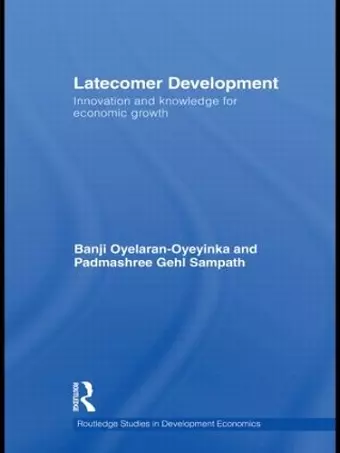Latecomer Development
Innovation and Knowledge for Economic Growth
Banji Oyelaran-Oyeyinka author Padmashree Gehl Sampath author
Format:Hardback
Publisher:Taylor & Francis Ltd
Published:27th Nov '09
Currently unavailable, and unfortunately no date known when it will be back
This hardback is available in another edition too:
- Paperback£51.99(9780415749923)

The most important issue for development centres on the debate about the centrality of knowledge, technology and innovation to the process of economic development. While this much is broadly agreed, what is at issue is the precise mechanics of overcoming economic development challenges in different contexts. At the heart of it all is about how economies at different levels deploy the unending streams of information and knowledge to developmental ends. In time, the notion of income convergence between the poorer South and the wealthy North has proved a mirage, while a new economic divide has in fact occurred within the South itself, and as well, between regions and within regions. The debate relating to latecomers is thus framed in discussions about regions and countries that arrive late to mastering industrialization in achieving economic prosperity through the use of knowledge. In other words, a new divide has emerged among the latecomers themselves, and with it, greater conceptual complexity in the ways of our understanding of the divergent ways of economic development. We have thus separated "fast followers" and new "late comers".
This book enters this debate acutely aware of the complexity of this process. The authors argue that economic development is largely driven by innovation, concentrating on the dynamics of process, product and organizational changes and how they are embedded within specific and varied contextual institutions.
"This is an interesting book on an important set of issues – the nature and determinants of invention and innovation – applied to the development process. It is equally useful for assessing growth possibilities for the already developed nations as many of their advisors and policy-makers simply extrapolate from past success rather than evaluate and learn from it. The book provides an extensive summary of the debates on the importance and determinants of technological change for development, putting increase emphasis on the role of the state and of institutions in development, especially for the most lagging countries ."
Michael Bradfield, Professor of Economics, Dalhousie University
"This book achieves two elusive goals. First, it creates a novel framework from two bodies of scholarship; the economics of innovation and learning, and development economics. From this framework and using new empirical data collected in a variety of African and Asian countries, the authors enrich our understanding of how latecomers learn and innovate to create wealth through knowledge accumulation. In addition, the book points to the heterogeneity of knowledge and capabilities accumulation that distinguish latecomers and in turn suggests a new way of understanding latecomer economies. This thoughtful and path making book deserves to be read by all innovation and development scholars, policy makers and students alike."
Prof. Alice Amsden, MIT
ISBN: 9780415560115
Dimensions: unknown
Weight: 660g
272 pages